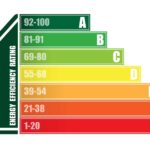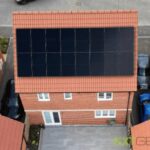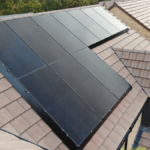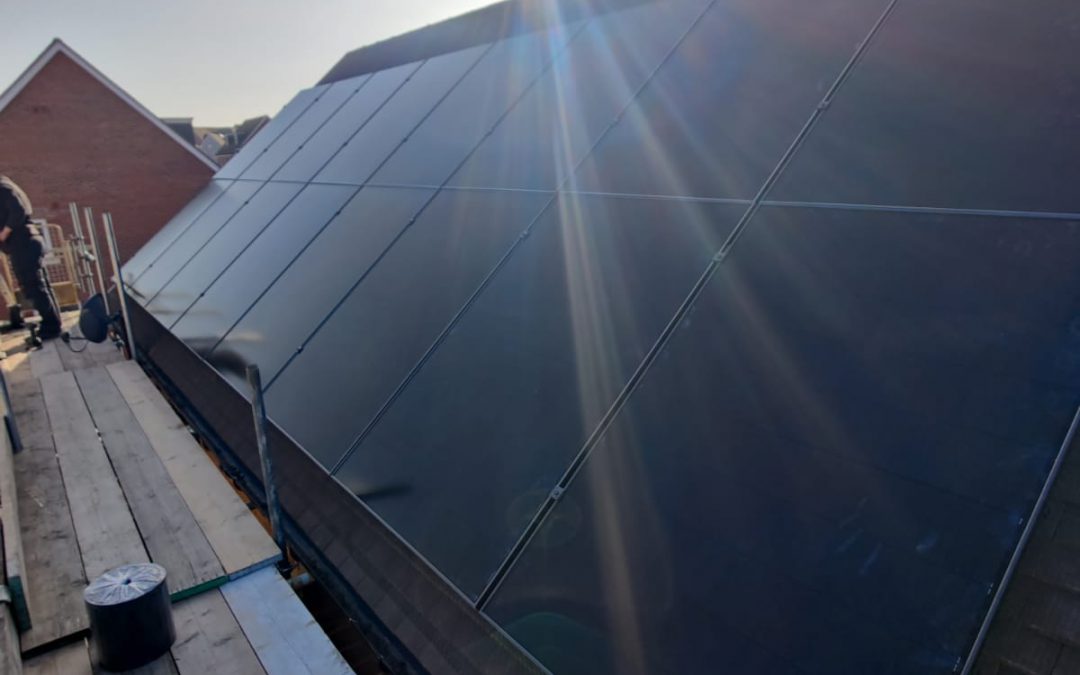There short answer is no. Some have blamed renewable energy for the UK’s decision to use coal power for the first time in over a month – but that’s not the case, say green activists, as the mercury rose above 30C.
The National Grid activated Ratcliffe-on-Soar power station in Nottinghamshire yesterday, as more people turned on their air conditioners to cope with the heatwave.
This ended a 46-day streak without coal-generated electricity, the longest since last summer, and drew criticism from environmentalists.
“This is a sign of failure that the National Grid is resorting to one of the most polluting forms of power generation to deal with a summer heatwave that we know has been worsened by climate change”
Ami McCarthy, Greenpeace UK’s political campaigner
However, some commentators also blamed renewable technology. “The heatwave made Solar Panels too hot to work efficiently,” claimed right-wing UK newspaper the Telegraph.
Industry groups stated that’s not the full story, however. More solar power is produced in the summer than any other time – regardless of how hot it gets, as solar energy is produced from sunlight and not heat.
“The idea that solar panels wilt in the heat is a gross and fundamental misapprehension”
Solar Energy UK
Can solar panels cope in the hot weather?
Solar panels are slightly less efficient at higher temperatures. Solar Photovoltaic (PV) cells convert a slightly lower proportion of sunlight into electricity in hotter conditions, solar groups explain.
However, they are built to normally function from about -40C to +85C. Performance does fall when temperatures go above 25C, but only by 0.34 per cent for every additional degree.
According to NXTGEN Energy Ltd, even at close to boiling point, power output would only be around 20 per cent lower.
The UK’s leading technical expert on the technology, Alastair Buckley, Professor of Organic Electronics at the University of Sheffield says that high temperatures only marginally affect the overall output of solar power – it’s a secondary effect. The university provides live Solar PV generation data which backs this up; solar power has been serving around 27 per cent of the UK’s power needs each lunchtime for this past week. Solar panels work perfectly well in the Saudi Arabian desert – and the same panels are being installed there as on rooftops in Birmingham or a field in Oxfordshire.
Coal and gas stations are less efficient in heatwaves too
Solar Energy UK says that heat affects not only solar panels, but also thermal power plants – such as coal, gas and nuclear – that need cool water to operate. As the climate gets warmer, this problem will get worse.
“Solar panels may lose some efficiency in high temperatures, but they are still cheaper and greener than fossil fuels. We need more solar power to fight climate change,” states SolarPower Europe.
“We need to make the most of every ray of sunshine, and we need to prepare the system for the electrified economy. That means investing in the grid and storage, so we can use and distribute renewable energy efficiently”
A new report from the European industry group says that the UK’s solar potential is limited not by the sun, but by the lack of investment in the power network.
“In summer, solar power should be our main source of energy, but we are wasting renewable energy because our grid can’t handle it, and we have hundreds of renewable projects that are stuck because they can’t connect,” said McCarthy.
Coal is already on its way out in the UK. It only produces 2 per cent of the electricity, and it will be phased out by October 2024.
Frequently Asked Questions about Solar Panels
Solar Panels are built to normally function from about -40C to +85C. Performance does fall when temperatures go above 25C, but only by 0.34 per cent for every additional degree.
Latest Solar Panel Posts
- Why Leisure Centres Should Invest in Solar Panels
 In recent years, the concept of sustainability has become increasingly vital in various industries, including leisure centres. As the global focus shifts towards environmental conservation and renewable energy sources, leisure centres are recognizing the importance of investing in sustainable practices to reduce their operating costs and their carbon footprint. One such sustainable solution gaining traction… Read more: Why Leisure Centres Should Invest in Solar Panels
In recent years, the concept of sustainability has become increasingly vital in various industries, including leisure centres. As the global focus shifts towards environmental conservation and renewable energy sources, leisure centres are recognizing the importance of investing in sustainable practices to reduce their operating costs and their carbon footprint. One such sustainable solution gaining traction… Read more: Why Leisure Centres Should Invest in Solar Panels - School Funding – Solar for Schools
 Solar energy is revolutionizing the way educational institutions approach sustainability and energy consumption. As schools seek innovative solutions to reduce costs, educate students about renewable energy, and minimize their environmental impact, the adoption of solar power has emerged as a compelling choice. Solar For Schools, a leading initiative in the field, empowers educational institutions to… Read more: School Funding – Solar for Schools
Solar energy is revolutionizing the way educational institutions approach sustainability and energy consumption. As schools seek innovative solutions to reduce costs, educate students about renewable energy, and minimize their environmental impact, the adoption of solar power has emerged as a compelling choice. Solar For Schools, a leading initiative in the field, empowers educational institutions to… Read more: School Funding – Solar for Schools - Homes with solar panels can sell for more than those without
 Harnessing the power of the sun to generate clean, renewable energy is not only a sustainable choice for homeowners but also a lucrative investment in the UK property market. Homes equipped with solar panels are increasingly commanding higher prices and attracting more buyers than their non-solar counterparts. In this blog post, we’ll delve into the… Read more: Homes with solar panels can sell for more than those without
Harnessing the power of the sun to generate clean, renewable energy is not only a sustainable choice for homeowners but also a lucrative investment in the UK property market. Homes equipped with solar panels are increasingly commanding higher prices and attracting more buyers than their non-solar counterparts. In this blog post, we’ll delve into the… Read more: Homes with solar panels can sell for more than those without - Solar Panels and EPC Ratings
 Solar panels have become increasingly popular as a sustainable energy solution, offering numerous benefits for both residential and commercial properties. In parallel, Energy Performance Certificate (EPC) ratings serve as indicators of a building’s energy efficiency. Understanding how solar panels can impact EPC ratings is crucial for maximizing energy savings and environmental benefits. This blog post… Read more: Solar Panels and EPC Ratings
Solar panels have become increasingly popular as a sustainable energy solution, offering numerous benefits for both residential and commercial properties. In parallel, Energy Performance Certificate (EPC) ratings serve as indicators of a building’s energy efficiency. Understanding how solar panels can impact EPC ratings is crucial for maximizing energy savings and environmental benefits. This blog post… Read more: Solar Panels and EPC Ratings - Is it worth buying solar panels in Basildon, Essex?
 ☀️ Over 10,000 homes in Basildon have a solar panel system installed. ☀️ You’ll normally break even on solar panels in less than 10 years. ☀️ A 3.5kW solar panel system will cost about £7,000 on average. Solar panels are becoming more affordable and more common in the UK, with over 1.3 million households already… Read more: Is it worth buying solar panels in Basildon, Essex?
☀️ Over 10,000 homes in Basildon have a solar panel system installed. ☀️ You’ll normally break even on solar panels in less than 10 years. ☀️ A 3.5kW solar panel system will cost about £7,000 on average. Solar panels are becoming more affordable and more common in the UK, with over 1.3 million households already… Read more: Is it worth buying solar panels in Basildon, Essex? - Wiltshire’s Good Energy Partners with bigHead to Achieve 50% Solar Energy Goal
 Wiltshire-based Good Energy has played a crucial role in helping Dorset manufacturing firm bigHead transition to utilizing solar power for 50% of its energy needs. Thanks to the collaboration between the two companies, bigHead has successfully installed 130 solar panels on the roof of its Verwood factory, resulting in significant cost savings of over £4,000… Read more: Wiltshire’s Good Energy Partners with bigHead to Achieve 50% Solar Energy Goal
Wiltshire-based Good Energy has played a crucial role in helping Dorset manufacturing firm bigHead transition to utilizing solar power for 50% of its energy needs. Thanks to the collaboration between the two companies, bigHead has successfully installed 130 solar panels on the roof of its Verwood factory, resulting in significant cost savings of over £4,000… Read more: Wiltshire’s Good Energy Partners with bigHead to Achieve 50% Solar Energy Goal - Unveiling the Perfect Fit: How Many Solar Panels Can Your Roof Handle?
 Harnessing the power of the sun is an attractive proposition for many UK homeowners. But before diving headfirst into solar energy, a crucial question arises: how many solar panels can fit on your roof? The answer, unfortunately, isn’t a simple one. It’s a captivating interplay between several factors, each one requiring careful consideration. Understanding Your… Read more: Unveiling the Perfect Fit: How Many Solar Panels Can Your Roof Handle?
Harnessing the power of the sun is an attractive proposition for many UK homeowners. But before diving headfirst into solar energy, a crucial question arises: how many solar panels can fit on your roof? The answer, unfortunately, isn’t a simple one. It’s a captivating interplay between several factors, each one requiring careful consideration. Understanding Your… Read more: Unveiling the Perfect Fit: How Many Solar Panels Can Your Roof Handle? - Powering Care with Sunshine: How Solar Panels Benefit Nursing Homes
 Nursing homes are the backbone of our communities, providing essential care for our elderly population. But keeping these facilities running smoothly requires a significant amount of energy – lighting, heating, cooling and medical equipment all contribute to a hefty energy bill. This is where commercial solar panels come in, offering a win-win solution for both… Read more: Powering Care with Sunshine: How Solar Panels Benefit Nursing Homes
Nursing homes are the backbone of our communities, providing essential care for our elderly population. But keeping these facilities running smoothly requires a significant amount of energy – lighting, heating, cooling and medical equipment all contribute to a hefty energy bill. This is where commercial solar panels come in, offering a win-win solution for both… Read more: Powering Care with Sunshine: How Solar Panels Benefit Nursing Homes - Who are NXTGEN Energy Ltd?
 NXTGEN Energy Ltd are a solar energy company based in Rayleigh, Essex, UK. They specialize in the installation of solar panels, battery storage systems, and electric vehicle chargers for homes and businesses across the UK. They are MCS certified, which means they meet the Microgeneration Certification Scheme’s standards for quality and safety. This makes them… Read more: Who are NXTGEN Energy Ltd?
NXTGEN Energy Ltd are a solar energy company based in Rayleigh, Essex, UK. They specialize in the installation of solar panels, battery storage systems, and electric vehicle chargers for homes and businesses across the UK. They are MCS certified, which means they meet the Microgeneration Certification Scheme’s standards for quality and safety. This makes them… Read more: Who are NXTGEN Energy Ltd? - Why UK Homeowners with Solar Panels Need Bird Proofing (Beyond the Basics)
 Imagine waking up to the quiet hum of your solar panels, generating clean energy to power your home. It’s a beautiful image, symbolizing lower electricity bills and sustainability. But what if a gang of birds decided the solar panels on your roof were the perfect spot for their new condo complex? Unfortunately, this idyllic scene… Read more: Why UK Homeowners with Solar Panels Need Bird Proofing (Beyond the Basics)
Imagine waking up to the quiet hum of your solar panels, generating clean energy to power your home. It’s a beautiful image, symbolizing lower electricity bills and sustainability. But what if a gang of birds decided the solar panels on your roof were the perfect spot for their new condo complex? Unfortunately, this idyllic scene… Read more: Why UK Homeowners with Solar Panels Need Bird Proofing (Beyond the Basics) - Solar Panel Financing
 At NXTGEN, we are committed to delivering excellent service and we understand that many customers may prefer the option of paying for their solar panels with finance. So, we’ve partnered with established credit brokers, Ideal4Finance, to enable customers to spread the cost of purchase with manageable monthly payments. We can offer 3 Flexible Finance Options… Read more: Solar Panel Financing
At NXTGEN, we are committed to delivering excellent service and we understand that many customers may prefer the option of paying for their solar panels with finance. So, we’ve partnered with established credit brokers, Ideal4Finance, to enable customers to spread the cost of purchase with manageable monthly payments. We can offer 3 Flexible Finance Options… Read more: Solar Panel Financing - How AI could supercharge your solar panels
 Imagine stepping outside on a crisp January morning, a mug of steaming tea warming your hands. You glance at your rooftop, not with dread at energy bills, but with a mischievous grin. Why? Because the sun, that cheeky orb in the sky, is being squeezed for every juicy watt it holds thanks to your AI-powered… Read more: How AI could supercharge your solar panels
Imagine stepping outside on a crisp January morning, a mug of steaming tea warming your hands. You glance at your rooftop, not with dread at energy bills, but with a mischievous grin. Why? Because the sun, that cheeky orb in the sky, is being squeezed for every juicy watt it holds thanks to your AI-powered… Read more: How AI could supercharge your solar panels

